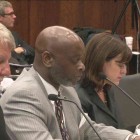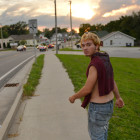
An Interview with the Photographer Behind the ‘Interrogations’ Series
|
Donald Weber spent six years living and working in the Russian Republic and Ukraine to create an incredible body of work documenting civilians being questioned by the police.
Juvenile Justice Information Exchange (https://jjie.org/page/306/)

In late September, Torri was driving down the highway with her 11-year-old son Junior in the back seat when her phone started ringing.
It was the Hamilton County Sheriff’s deputy who worked at Junior’s middle school in Chattanooga, Tennessee. Deputy Arthur Richardson asked Torri where she was. She told him she was on the way to a family birthday dinner at LongHorn Steakhouse.
“He said, ‘Is Junior with you?’” Torri recalled.
Earlier that day, Junior had been accused by other students of making a threat against the school. When Torri had come to pick him up, she’d spoken with Richardson and with administrators, who’d told her he was allowed to return to class the next day. The principal had said she would carry out an investigation then. ProPublica and WPLN are using a nickname for Junior and not including Torri’s last name at the family’s request, to prevent him from being identifiable.
When Richardson called her in the car, Torri immediately felt uneasy. He didn’t say much before hanging up, and she thought about turning around to go home. But she kept driving. When they walked into the restaurant, Torri watched as Junior happily greeted his family.
Soon her phone rang again. It was the deputy. He said he was outside in the strip mall’s parking lot and needed to talk to Junior. Torri called Junior’s stepdad, Kevin Boyer, for extra support, putting him on speaker as she went outside to talk to Richardson. She left Junior with the family, wanting to protect her son for as long as she could ...

Donald Weber spent six years living and working in the Russian Republic and Ukraine to create an incredible body of work documenting civilians being questioned by the police.

Think of all the benefits we heap on our children, the advantages we say they all should have. Why does all that disappear when a kid gets arrested?

Being a prisoner isn’t easy. Prisons in the United States, including juvenile prisons, are terrible places to be.

A new report released by the International Association of Chiefs of Police (IACP) takes a look at law enforcement perspectives on young offenders and juvenile justice system collaboration. Nearly 1,000 agency executives were interviewed for the survey, which was supported by the John D. and Catherine T. MacArthur Foundation. According to researchers, nearly four out of five respondents said they believe law enforcement leaders should play pivotal roles in the juvenile justice system.

According to a survey commissioned by the Illinois Department of Juvenile Justice, the state of Illinois has experienced significantly higher rates of sexual misconduct within its youth correctional facilities than most other states.

Reflecting on Orange is the New Black and a personal experience working with incarcerated women.

Every night, Vernon Foster sleeps in the public bathroom, without a blanket, or bounces around to the houses of various friends and acquaintances to sleep on the floor.

A young photographer gains the trust of a teenager living a largely transient lifestyle to document his experience bouncing between friend's houses, bathroom stalls and the local McDonalds.